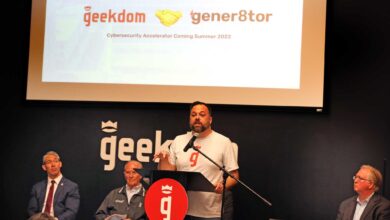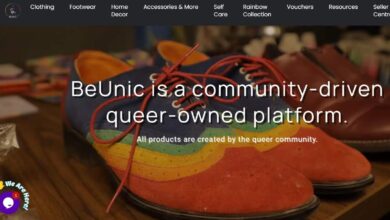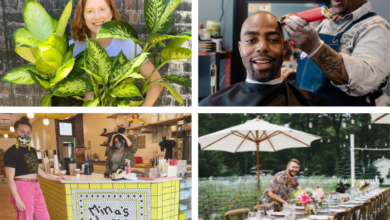Be True To Yourself At Work, And Take Pride In Who You Are

The business landscape is changing on nearly every metric and we are all part of that change so by … [+]
Pride Month is dedicated to celebration and commemoration of the LGBTQ community. It is also used to highlight where advances still need to be made to improve representation of the community, including business and the workplace.
A recent Graduate Management Admissions Council (GMAC) report demonstrates how engagement is improving within graduate management education. They found that the proportion of Full-Time MBA programmes in the US that conducted special outreach to the LGBTQ community increased from 31% in 2019 to 47% in 2022. The US is ahead of the international market, which saw outreach at 31% of global FT MBA programmes. This increased outreach should result in increased representation of the community within business schools.
However, there is still a long way to go in the world of business. As of 2023, only four of the Fortune 500 CEOs openly identify as LGBTQ. Just ten years ago, this number was zero.
As more individuals feel comfortable being open about their identity, with members of the LGBTQ community feeling represented and empowered enough within the business world to climb the ranks and reach top positions, this number should continue to rise.
Thomas ‘Tommy’ Meehan was named a ROMBA Fellow for the MBA Class of 2024 at UT Austin, McCombs. Currently a Summer Associate at McKinsey he is aware of the significant progress made in the past decade, from changes in corporate policies to improved representation across industries, yet feels there is still much more work to be done.
“When acceptance is a given, it allows LGBTQ+ professionals to contribute in a more fulfilling and … [+]
“To create an even more inclusive environment in business for LGBTQ+ professionals, companies should focus on transforming their culture to allow everyone to bring their whole selves to work and create equal opportunities for LGBTQ+ advancement. Employees are asked to devote a substantial portion of their lives and time to work, and must be allowed to be ourselves in the office.
Personally, Tommy feels that he is more likely to stay with a company that accepts and recognizes who he is as a gay man. “When acceptance is a given, it allows LGBTQ+ professionals to contribute in a more fulfilling and productive way, which is excellent for business and makes for happier employees. And, importantly, it’s the right thing to do!”
READ TOMMY’S STORY HERE
As the President of the LGBTQ and Allies Club at Notre Dame’s Mendoza College of Business, Chelsea Reyes MBA Class of 2024 is leading the way to support the diversity and inclusion strategy of the school. She believes that the conversation around gender and sexuality has changed since she started her career. “There is more focus on intersectionality and representation of the LGBTQ+ community both in the talent pool and companies’ messaging. For instance, June is pride month and the imagery has moved toward capturing as inclusive of the community as possible. More specifically, depictions of queer women and trans folx have emerged, evident in companies celebrating things for lesbians and trans folx.”
“There are allies everywhere and people care so embrace them by accepting offers of help, advice, … [+]
Whether considering business school, or in your career path and ventures, Chelsea offers encouragement. “Be true to yourself, and take pride in who you are. The business landscape is changing on nearly every metric and we are all part of that change so by being authentic, one creates value. There are allies everywhere and people care so embrace them by accepting offers of help, advice, and connection.“
READ CHELSEA’S STORY HERE
That support and network can be invaluable for entrepreneurs, but when it comes to LGBTQ individuals starting their own companies, the figures are disappointingly low: LA-based venture capital firm Backstage Capital estimates that LGBTQ entrepreneurs receive less than 1% of VC funding. And according to StartOut, a startup accelerator offering mentoring, education, and networking for LGBTQ entrepreneurs, 37% of LGBTQ startup founders choose not to come out, some citing concerns that it would hurt their chances to secure capital.
But some are already leading the charge, with many using their own lived experiences to motivate the work of their business venture.
Steve Keith launched Curious Consulting after almost eight years in a corporate role, and originally focused on working with student employers to create engaging employer branding and recruitment marketing campaigns for young people exploring their career options.
“There are still a huge number of people who either don’t feel comfortable sharing their sexuality … [+]
“After the pandemic, I made the decision to pivot the work that I do with them towards diversity, equity, inclusion and belonging. This intentional shift leaned into my own experiences as a cisgender gay man, the first in their family to go to university, who lives with anxiety and depression,” says Steve. “I now work with the same group of employers to create brand experiences that use my own lived experiences to help them better connect with a more diverse group of young people.”
Steve studied a MA in Management at Durham University Business School, in the UK, and believes this education was vital to his success with Curious Consulting, providing a strong foundation in which he often relies upon in his work. “Other units I studied covering the importance of business marketing have been integral to both launching my business five years ago, but also in continuing to build my personal brand,” he insists.
READ STEVE’S STORY HERE
LGBTQ individuals can face many difficulties within the business world and as entrepreneurs, but it is important for those who are open and comfortable to be visible to others within the community.
“It is incredibly important to have diverse voices of all kinds in executive and leadership roles, not just LGBTQ+, but people of colour, people with disabilities, people who come from working class backgrounds, people who are female, trans and non-binary, people from immigrant families, and those who exist in the intersectionalities of those identities,” states Teale Failla, Business Manager at Somewhere and Project Manager for the Somewhere Rainbow Enterprise Network.
“We provide the means for LGBTQ+ people and organisations to connect, create and inspire each other … [+]
The research Teale conducted during her business education reiterates how diversity within an organisation can be beneficial to a company Itself: “My MBA dissertation was on leading creative teams in the UK television industry. Through that research, I found study after study, as well as my interviews, illustrate how having diverse leadership improves creativity, lowers costs and increases profit.”
It was Teale’s experience on her MBA at the University of Edinburgh Business School in Scotland, which gave her the knowledge and skills for business. “Before doing the MBA, I had no idea what a business plan was or all of the factors to think about when starting a business,” admits Teale. “All of my courses provided a well-rounded and thorough education to not just start a business, but indeed to work in any business or venture.”
Teale’s work at Somewhere, a new Community Interest Company in Scotland dedicated to championing Scotland’s LGBTQ+ community, “aims to increase the visibility of diverse LGBTQ+ lives, creating spaces and opportunities for LGBTQ+ people to thrive as their authentic selves, particularly in creative and enterprise spheres,” she says. “As such, we provide the means for LGBTQ+ people and organisations to connect, create and inspire each other to make positive change.”
READ TEALE’S STORY HERE
Steve Keith acknowledges that getting more LGBTQ individuals into executive roles and being visible as role models is important. He also believes LGBTQ executives have a responsibility to help others build the confidence they need to climb the ladder.
“There are still a huge number of people who either don’t feel comfortable sharing their sexuality in the workplace, or who have chosen to go back into the closet when starting a new job. That’s a personal choice, and it has to be respected. However, I will argue that this choice is heavily influenced by whether or not an LGBTQ+ person feels safe and comfortable to be themselves at work,” Steve explains.
Lynette Seow comes from Singapore, where sexuality isn’t as frequently or openly discussed. “I wouldn’t pass as straight, but there sometimes was anxiety when conversations around relationships arose in various situations and I’d tried to avoid the topic. It was quite easy to keep discussions “strictly business” and stick to numbers and data.
With a business undergrad from Singapore Management University and a Masters of Technology from National University of Singapore, Lynette spent over five years with IBM as a consultant and ultimately a Business Transformation Manager. She then headed to MIT Sloan for her MBA and was awarded an Opportunity Stimulus Fellowship. During her studies she co-founded Safe Space™ Singapore, a B2B2C platform that strengthens mental resilience by providing tele-therapy care and prevention education.
“There are many LGBTQ+ folks who have started businesses because they struggled to bring their … [+]
“Ultimately I figured that if I wanted to BUILD a Safe Space for people to come to, I had to BE one to the people I met. If improving mental health is my mission, and a disproportionate percentage of LGBTQ+ people experience mental health struggles, how could I ignore drawing attention to this cause even if it meant being a bit more public about my personal life? It meant sharing about uncomfortable experiences, internal struggles and ongoing unconscious discrimination.
That said, Lynette feels that being an LBGTQ+ entrepreneur has had some unique opportunities. “There are many LGBTQ+ folks who have started businesses because they struggled to bring their authentic selves to a corporate workplace. Having access to this network of fellow entrepreneurs and queer-run businesses creates a strong sense of community and support. People are exceptionally willing to help you out by making an introduction or taking a meeting with you when they can identify in a personal way with you, and that helps to build deeper connections that has business benefits.
READ LYNETTE’S STORY HERE
Diego Lazaro is another entrepreneur using his company to create a safer work environment for LGBTQ employees and empower colleagues and managers to drive positive changes within their organization.
With a Master’s degree in Human Resource from EAE Business School in Spain and a Bachelor’s degree in International Hospitality Management from EHL Hospitality Business School in Switzerland, Diego is the founder and a consultant for Be Diverse, providing innovative consulting and training services to companies to reinforce their brand reputation and attract the best talent.
“What makes us unique is our expertise in diversity and inclusion and more specifically in the field of LGBT+ inclusion.The consulting services we provide to companies aim at improving both their human resources strategy as well as their stock exchange rating by implementing corporate social responsibility initiatives,” explains Diego.
Diego credits his business education in aiding him in his journey towards founding his company: “During my undergrad in International Hospitality Management, I had a variety of courses ranging from marketing to accounting, economics and entrepreneurship. It was a very hands-on programme with a mix of theory and practical work through group projects and internships. A few years later I completed a Master’s degree in Human Resources Management in Spain which enabled me to understand business needs from a human perspective.”
Musing on the struggles he has faced as an LGBTQ entrepreneur, particularly fighting against the notion of ‘woke theory’, Diego explains the term ‘being woke’ has come to be used as an insult against all progressive ideas. “Some people believe that talking about LGBTQ+ inclusion in the workplace is also part of the ‘woke attitude’. As a result, we are experiencing an important backlash in Western countries. My main challenge is to make people understand that being LGBTQ+ is a social and economic issue that is crucial for the future of any private company. The purpose of my project is to bring this awareness to the business world and to help build a society where we all fit, no matter our differences.”
Yuli Kim, Founder of Inclusion Sensei and Programme Development Director at Workplace Pride, was also motivated to ensure workplaces are safe environments. “Everybody should feel safe at work, but not everybody does. Workplace inclusion matters because it impacts people’s performance. My goal is to help organisations navigate their DE&I journey by providing concrete advice on how to get where they aspire to be.”
A BA Law and MBA graduate of Rotterdam School of Management, Erasmus University, in the Netherlands, Yuli is aware how crucial visibility is to getting more LGBTQ people into executive roles: “It’s not easy to become what you don’t see. There are several ways to tackle this challenge. The most important thing as a community is stay visible and keep addressing the power of diversity, equity and inclusion.”
Fabien Figula Letort, MSc in Management graduate of emlyon business school in France, agrees on the importance of increasing visibility, and acknowledges how role models are a key component.
“First, they set the path and open the ways to other LGBT+ individuals. They also show to non-LGBT+ individuals that despite being a part of a minority, they can deliver just as well as those from the majority. Second, it shows to young LGBT+ people that it is possible to have a career, to be successful in business and in their professional life,” outlines Fabien.
“We believe that most of the solutions already exist. We help those ideas rise and come to reality.” … [+]
Fabien co-founded AFL Diversity two and a half years ago with his husband Adrien, helping companies and organisations be more inclusive in a variety of areas including gender equity, disabilities, LGBTQ, origins, and generations. Fabien explains, “We organise a lot of collective intelligence workshops as we believe that most of the solutions already exist, and employees usually know what to do when it comes to inclusion. We help those ideas rise and come to reality.”
READ FABIEN’S STORY HERE
Beyond the difficulties one might face being LGBTQ in the business world or as an entrepreneur, there are still places around the world where LGBTQ individuals are not provided the same legal protections as others against discrimination. This can make it difficult for LGBTQ people, particularly couples, to visit certain places. Out Of Office, a luxury travel specialist founded by Darren Burn, believes in travel for all, regardless of who you love.
A BA Business Management & Economics graduate of King’s Business School, based in London, Darren is also CEO of TravelGay, the world’s most visited LGBTQ+ travel resource: “Initially, the focus was on improving LGBT travel experiences, but we later narrowed it down to the luxury market, building the brand over the years in the UK and North American markets.”
“eople are beginning to understand that being inclusive and accepting makes commercial sense as … [+]
Although Darren acknowledges the perception and acceptance of LGBTQ individuals in the workplace has improved over time, the existence of his company is almost evidence to how there is still progress to be made: “My company exists to serve the LGBTQ travel community. Ideally, we wouldn’t need such a business, and everyone would be fully accepted. In the UK, diversity is now a prevalent topic, and people are beginning to understand that being inclusive and accepting makes commercial sense as well.”
READ DARREN’S STORY HERE
Within the LGBTQ community, the phrase ‘love is love’ holds much importance. For individuals whose relationships may be frowned upon, denied, or even unlawful in some parts of the world, the declaration and allowance to be yourself, regardless of gender or sexuality, is incredibly powerful.
Business education and romance may not always go hand in hand, and finding love at business school isn’t exactly a cliché of the experience, but it was a reality for married couple Lionel Choo and Lukas Peter, who met during their studies at EHL Hospitality Business School.
“The hospitality sector attracted me as it was a field where I didn’t need to seek ‘permission’ to … [+]
For Lionel, now a Travel, Hospitality and Leisure Advisory Manager for Deloitte, he believes his experiences as a young LGBTQ person enabled him to develop a level of empathy potentially vital to his chosen career path. “Encountering prejudices as an LGBTQIA+ individual in Singapore early in life instilled in me resilience and a deep sense of empathy for others who felt marginalised or side-lined by society. The hospitality sector attracted me as it was a field where I didn’t need to seek ‘permission’ to excel, a place where empathetic individuals could indeed thrive,” explains Lionel.
READ LIONEL’S STORY HERE
Lukas, Head of Revenue and Commercial Strategy for Archer Hotel Capital, has a similar view about the acceptance of the hospitality industry. “The hospitality industry has always been a welcoming space for the LGBTQ+ community. And it’s been amazing to see this acceptance grow, particularly with a fresh wave of young professionals joining us. Even in sectors like finance and investment, traditionally male-dominated, things are shifting. At Archer Hotel Capital, we’re doing our part too, and are forming a D&I committee.”
A similar story, Leandro Lanzoni and Vitor Kawamura both attend the postgraduate programme in International Business at Porto Business School in Portugal, but were married before pursuing business education at the same institution.
Speaking on the evolution of attitudes and inclusivity towards LGBTQ individuals within business since they began their careers, they say, “Initially, we faced challenges related to our sexual orientation and felt the need to hide our identities in previous jobs. In recent years, we have witnessed a positive transformation.”
“Initially, we faced challenges related to our sexual orientation and felt the need to hide our … [+]
Leandro, a Global Marketing Manager, continues, “My current experience at Gympass, a tech company based in New York with an office in Portugal, exemplifies this positive shift. Gympass have inclusive policies, affinity groups, and a culture that values diversity and mitigates biases. This industry-wide change reflects a growing commitment to LGBTQ+ rights and equal opportunities.”
And as a business owner of a small company, Vitor Kawamura, Managing Partner at WP Capital explains that he “deeply embraces the cause by giving an open environment to diversity.”
READ VITOR AND LEANDRO’S STORY HERE
In a world where some can view difference or diversity as something negative, to be tolerated, or a “woke attitude”, Vitor and Leandro give some great advice for LGBTQ individuals considering a business education or career in the business sector: “Be proud of your identity and embrace your unique perspectives and experiences. Your diversity should be a valuable asset in the business world.”





